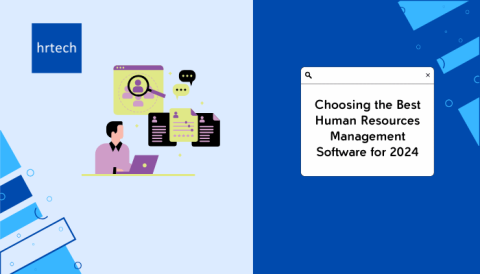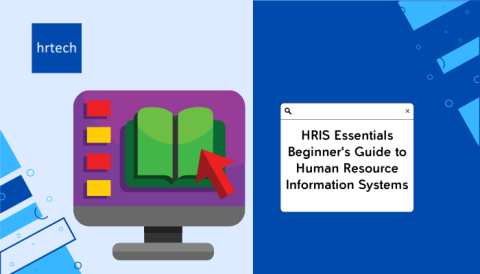The pandemic has highlighted the need for HR teams to become more analytical and forensic in skills forecasting. In fact, they must rewire all performance and incentive mechanisms to reward employees for learning the abilities they require.

The pandemic has highlighted the need for HR teams to become more analytical and forensic in skills forecasting. In fact, they must rewire all performance and incentive mechanisms to reward employees for learning the abilities they require.
In my discussion with Andi Britt, he speaks about the critical HR skills of the future; how HR teams can present a strong business case for HR Tech investments; how HR teams can become data-driven and tech-savvy; and much more.
Andi leads the European Talent Transformation practice within IBM Consulting, providing Human Capital Management, HR and Recruitment Outsourcing and Organizational Change Management advisory services for clients. Andi has worked with IBM Consulting’s largest global clients in the public and private sectors on HR Outsourcing, Cloud SaaS, ERP and enterprise-wide change management engagements. He is a thought leader on AI, Automation and Digital HR and how organisations can transform their Talent practices with Cognitive, Cloud, Robotics and Mobile solutions. He is a regular presenter on IBM’s Research on AI, HR Reinvention, Culture Change, Change Management and Employee Engagement. Having started his career at PwC, Andi is a qualified Chartered Accountant (ICAEW) and was featured in the Financial Times inaugural ‘Power Part Time’ list in 2012.
Here are the excerpts from the Q&A with Andi that focused on HR function’s transformation:
What has been the impact of a pandemic on the organisation, and more specifically the HR function?
- The pandemic has highlighted the importance of people and people-related decisions for all organizations. Whether it’s deciding how to enable your workers to work remotely, about what’s the size and the shape of the workforce that we’re going to need after the pandemic, or issues around mental well-being, health and wellness etc, people issues and HR have suddenly become a board-level issue. There has never been a more important time for HR professionals to step up to the challenge as all organisations have to make key “people” decisions.
- Companies are now embarking on a journey into an uncertain future. We used to refer to the corporate environment as being ‘VUCA’ (volatile, uncertain, complex, and ambiguous). However, the pandemic has accentuated this 1000-fold. As organisations come out of the pandemic, they’re beginning to consider what kind of skill set they’ll need in their workforce to navigate the uncertain economic and competitive environment.
- In a research conducted by IBM Consulting at the end of 2019, approximately 500 business leaders were questioned, “What do you think are the most important skills you need from your people?”. The #1 skill that all business leaders mentioned was “adaptability”. Seek out talent who can quickly adapt their abilities, role, and approach to fit the direction in which the organisation is heading and are able to do that repeatedly and fast.
- Organizational psychologists are now talking about the Adaptability Quotient (AQ), the ability to thrive in changing circumstances, and not just to operate in a fixed role with clearly defined job responsibilities. Organisations need to train their employees to be adaptable because skills are becoming obsolete at an ever-faster rate. That‘s why many companies are stressing the need for staff to constantly re-invent themselves by refreshing their skills and experience. Today’s corporate culture has to be one where employees see it as their prime responsibility to refresh their skill sets – or to put it another way our people need to binge learn at work as they might binge-watch Netflix at home.
What is HR’s role in overall digital transformation in the new workplace?
- HR needs to shift its focus from measuring FTE and headcount to measuring skills. HR professionals need to know what skills and proficiency levels exist across the organisation, and how quickly these can be dialled up and down. The HR department must become more analytical and forensic in forecasting, which skills we need more of and which capabilities we need less of. Offering richer learning and badging programmes is a start, but companies also need to rewire all performance and incentive mechanisms to reward employees for learning the skills and competencies they require.
- Data and insights are now becoming the stock in the trade of the HR professional. In the future, we may not need payroll ‘administrators’ because these types of tasks can be automated. So HR professionals must accept that their days of doing clerical or fairly low functional work are gone. They must advance into the realm of analytics and insights. And I think the future is going to highlight the centrality of workforce planning as an HR discipline.
How do you help HR teams’ develop their business case and ROI for HRTech investment proposals?
- Show them examples of where a similar technology or innovation has been adopted in a similar or different firm, and how it has generated benefits and ROI.
- Start small, demonstrate the benefits. Instead of trying to make the huge business case, break it down and execute it in stages. You can pilot new tech quickly with a small test user group and at a fairly low cost. Then you get a feel of what the impact is right away and get valuable insights from real users. Sometimes it’s better to go to the board and say, “Look, we want to start off with just $50,000 investment to test this will work for our company,” rather than saying, “We will need $10 million to start this programme.”
What does the post-pandemic workplace look like? And what will be its impact on HR teams?
- I think our working practices will evolve, so much so, that you go to the office or a meeting room only for specific purposes. And those purposes are likely to be co-creation, design, or situations where you need to gather a team to work on a specific task or achieve a specific result. So we’ll be more outcome-oriented in our meetings, and you’ll just meet in that space for as long as you have that specific assignment or activity to do; many activities will be dispersed.
- This hybrid work pattern will of course have a significant impact on business travel and how we conduct our meetings.
- Thankfully, most organisations have understood that we don’t need to track our employees or check whether they are working; we simply need to trust them and give them the tools to perform. After all the pandemic has reminded us how adaptable, resilient and hardworking our people are.
How can you get HR teams to become more data-driven and tech-savvy?
- My first recommendation to HR professionals is to look at the data and reports you already have in your HR systems and the analytics and correlation that is already available.
- Consider what analytics could provide to help you better understand a problem when it arises in your company. Try to see what insights you can acquire from the data to address that problem; remember, the data doesn’t always provide the answer, but it can provide a framework for asking the proper questions of your data.
Advice for businesses who are embarking on their Digital HR journey
- When you think about your digital journey, you don’t necessarily start with technology; instead, you start with the employee, the manager – and how you might improve their everyday experience. What will make their lives simpler, or free up their time or give them better insights to make decisions. Let’s be obsessed with creating a great employee experience, a great manager experience. If the latest, post-pandemic global attrition statistics are anything to go by, then employee experience is going to be one of the main levers of people retention.
- You can begin by teaching Design Thinking to your HR team. Design Thinking, which is one of the main professional disciplines we follow in IBM Consulting, allows you to co-create HR experiences with your employees – targeting a digital experience that will delight them – and then configuring your technology and processes around the experience.
- So, I think it’s important to start where can you improve or introduce incremental enhancements to the employee experience, whether it’s onboarding, learning, performance management, or compensation and benefits. Start with the problem that you are trying to solve, and not the technology.
About the author :

Sriram Iyer is a Human Resources practitioner with around two decades of experience in the areas of HR Technology, Workforce Planning & Strategy, Talent Supply Chain, Employee Engagement, Talent Branding and Acquisition & Client Management. Based in Singapore since Jan 2012, he has strong exposure to the JAPAC region and has a knowledge of the cultural nuances of the region. Prior to becoming an entrepreneur, he has also played leadership roles with NCS (Singtel Group Enterprise) and Nasdaq-listed Cognizant Technology Solutions in Singapore, running large scale talent initiatives across regions. He is a proud alumnus of National University of Singapore (Singapore) and Symbiosis Institute of International Business (India).




